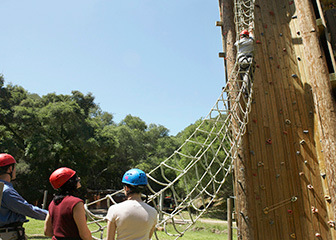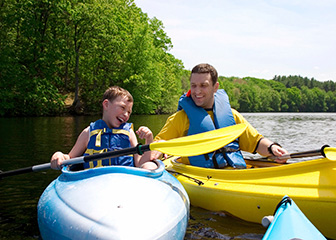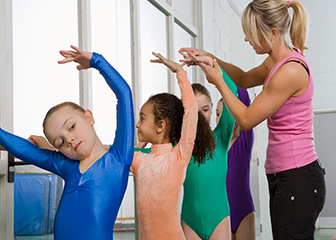
Recreation workers make sure that participants abide by the rules of a recreational facility so that there are no injuries.
The education and training requirements for recreation workers vary with the type of job but many workers have a bachelor’s degree.
Education and Training
Although a degree can be helpful, for many part-time recreation workers, such as camp counselors and activity specialists, other qualities are more important. These qualities include a worker’s maturity level, experience leading activities, ability to work well with children or the elderly, and ability to ensure safety of participants.
Most seasonal and part-time workers learn through on-the-job training. Specialized training or experience in a particular field, such as art, music, drama, or athletics, may help in obtaining a job.
Most recreation workers who work full time need at least a bachelor’s degree. Recreation workers who work full time include those working in administrative positions or for large organizations.
Degrees in parks and recreation or in leisure studies may prepare a student better than a liberal arts degree. However, either type of degree may be enough for some jobs.
Associate’s and bachelor's degree programs in parks and recreation, leisure studies, or related fields are available at colleges and universities. Master’s or doctoral degree programs also may be available, but are less common.
All programs include courses in management, community organization, supervision, administration, and development of programs for populations with specific needs, such as the elderly or disabled. Students may specialize in areas such as therapeutic recreation, park management, outdoor recreation, industrial or commercial recreation, and camp management.
Employers hiring recreation workers in supervisory or administrative positions often prefer applicants with work experience and at least a master’s degree in parks and recreation, business administration, or public administration. Most require at least an associate’s degree in recreation studies or a related field.
Important Qualities
Communication skills. Recreation workers must be able to communicate well to work with large groups of people while maintaining order and safety. They also must be able to motivate people to be active and to learn or improve skills.
Leadership skills. Recreation workers should be able to lead both large and small groups. They often lead activities for people of all ages and abilities.
Physical strength. Recreation workers need to be physically fit. Their job requires a considerable amount of movement because they often demonstrate activities while explaining them.
Problem-solving skills. Recreation workers need strong problem-solving skills. They must be able to create and reinvent activities and programs for all types of participants.
Speaking skills. Recreation workers must be able to communicate well. They often work with large groups of people and need to maintain order and safety.
Certification
The National Recreation and Park Administration (NRPA) provides certification for recreation workers. To qualify for the certification exam, individuals must follow one of four pathways:
- Earn a bachelor’s degree in a major such as recreation, park resources, or leisure services from a program accredited by the NRPA
- Earn a bachelor’s degree in a related major from any institution and, if the program is not accredited, have at least 1 year of experience
- Earn any other bachelor’s degree and have at least 3 years of relevant full-time work experience
- Have at least 5 years of full-time experience in the field.
Some recreation jobs require certification. For example, a lifesaving certificate is required for teaching or coaching water-related activities. These certifications are available from organizations such as the YMCA or Red Cross. Specific requirements vary by job and employer.
Advancement
As workers gain experience, they may get promoted to positions with greater responsibilities. Recreation workers with experience and managerial skills may advance to supervisory or managerial positions. Eventually, they may become directors of a recreation department.












